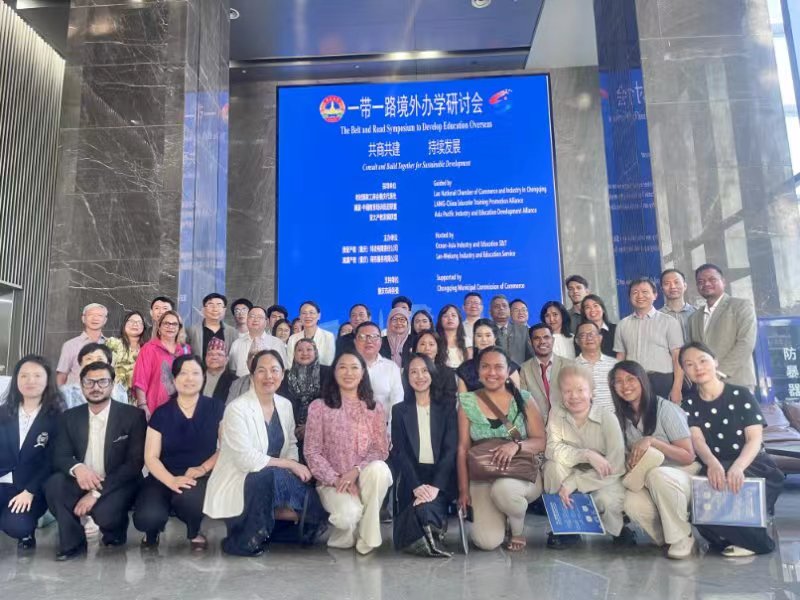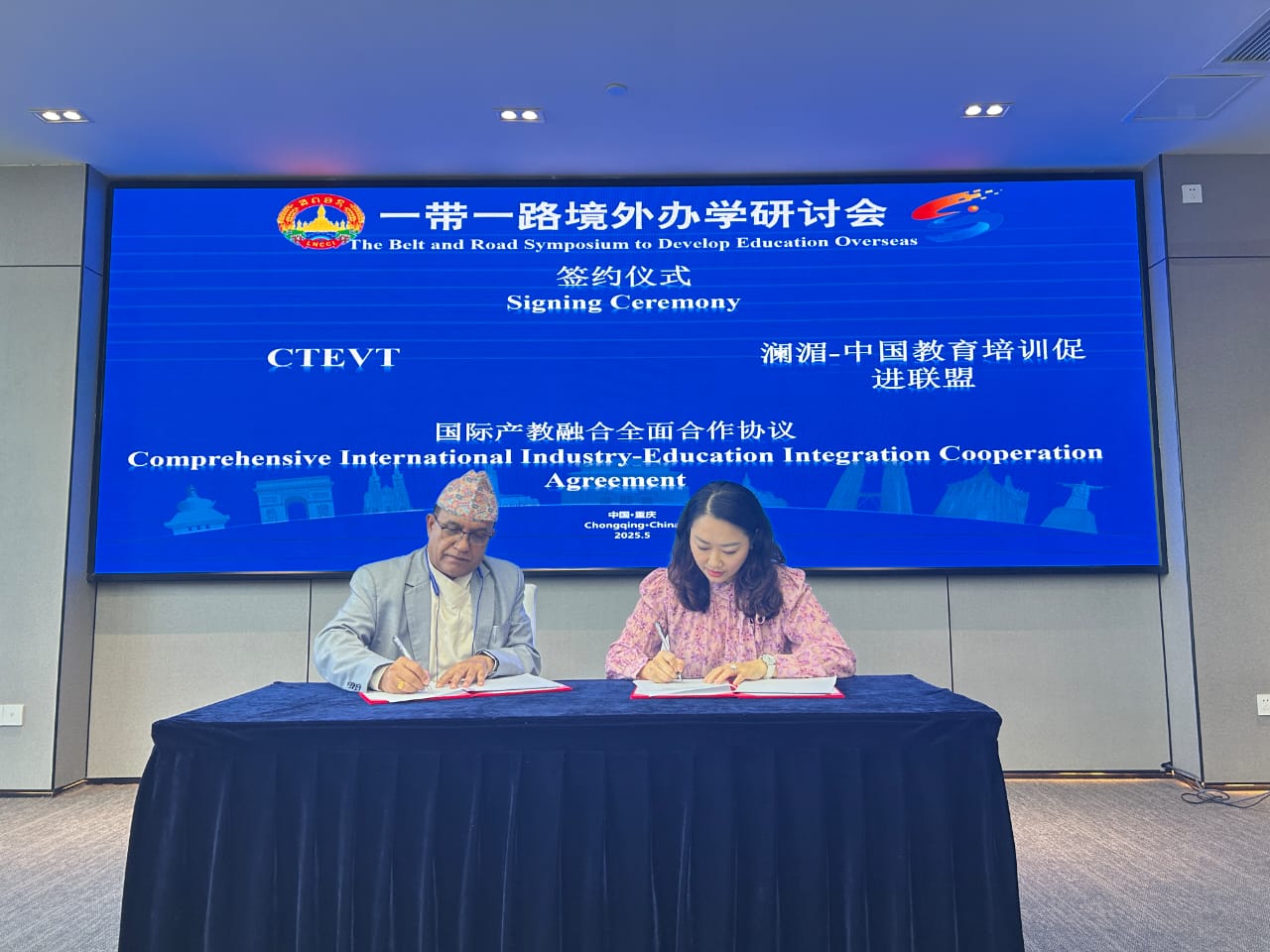
May 22, 2025
Delegates attends Symposium for How to Develop Education Overseas along “The Belt and Road”
On May 22, 2025, as a key event under the 7th Western China International Fair for Investment and Trade (WCIFIT), the Symposium for How to Develop Education Overseas along “The Belt and Road (TBR)” was grandly held at the Chongqing Belt and Road Business Center. Supported by the Commission of Commerce under Chongqing Municipal, this symposium was guided by the Lao National Chamber of Commerce and Industry (LNCCI), the Asia-Pacific Industry-Education Development Alliance (APIEDA), and the Lanmekong-China Education and Training Promotion Alliance (LCETPA). It was co-organized by the Ocean-Asia Industry Education Technology Center and the Lan-Mekong Industry Education Business Center. The event invited VIP guests from 14 different countries along with 3 Nepalese delegates, (Mr. Tailendra Acharya, Mr. Navraj Koirala and Mr. Bhakta Pralad Pandey) with several representatives delivering speeches and keynote reports. Focusing on the internationalization of Technical and Vocational Education Training (TVET) education and integration of industry and education, the symposium attracted government officials, representatives from over 30 Chinese educational institutions, and business leaders as well. Those 14 countries included Brunei, Timor-Leste, Laos, Vietnam, Malaysia, Thailand, Cambodia, Philippines, Myanmar, Nepal, Kazakhstan, Azerbaijan, Pakistan and Kyrgyzstan. Together with domestic representatives from government, schools, industry, and enterprises, they explored innovative pathways and cooperation models for education overseas along the “Belt and Road” framework. The symposium was chaired by Ms. Jade Fei, Secretary-General of LCETPA.
I. Multinational Gathering to Explore New Opportunities in TVET Education Cooperation
The symposium commenced with an opening address by Ms. Kuang Huan, representative of the Tariff Bonded Port in Chongqing Liangjiang New Area. It brought together representatives from official institutions and educational organizations across Asian countries, including the Lao Youth Union, the Southeast Asian Ministers of Education Organization Regional Centre for Vocational and Technical Education and Training (SEAMEO VOCTECH), the Council for Technical Education and Vocational Education (CTEVT), the National Institute of Human Resource Development in Timor-Leste (INDMO), and the Ministry of Education of Kazakhstan and others. Delegates shared insights on the current state of TVET education in their countries, addressing challenges, cooperation needs, development directions, and collaboration models. These discussions underscored the strong demand for internationalized industry-education integration among “Belt and Road” countries and their expectations for future Digital and Green advancements in this field.
II. Domestic Institutions and Enterprises Lead, Showcasing Achievements in TVET Education Internationalization
Domestic representatives shared cutting-edge practices in international industry-education integration:
- ChongQing Polytechnic University of Electronic Technology (CQUET) presented its “Four Rings, Four Drives” model, empowering Chinese automotive brands to expand globally by creating a “Central Asia Model” that integrates “Chinese Language + Vocational Skills.” This approach fosters a talent matrix combining technical skills and cultural competence for China’s automotive industry.
- Guangdong Construction Vocational Technology Institute, leveraging advanced teaching facilities and close industry partnerships, has become a benchmark for international cooperation in construction-related vocational education, cultivating numerous high-quality technical talents.
- Changjiang Institute of Technology (CIT) drawing on Wuhan’s educational resources, shared its practical experience in “Promoting International Cooperation and Exchange to Serve the Belt and Road,” highlighting the unique advantages of vocational education internationalization in central China.
- Winland Group provided an in-depth analysis of the key challenges, pain points, and difficulties, proposing feasible solutions for TVET graduates job seeking.
- Allan Yang, representing The LNCCIC and LCETPA delivered a detailed presentation on how to achieve sustainable development in TVET international cooperation, especially from the financial sustainability standing point of view, with attendees noting that the proposed initiatives were practical and worthy of pilot promotion.
III. Solid MOUs and cooperation agreement signed
 Six groups of cooperation agreements and MOUs were successfully signed at the symposium, covering several countries and fields, including Nepal, Timor Leste, Laos, Japan, Mid-East and Central Asia, etc., and relating AI, IOT, NEV, LMS, intelligent manufacturing, and international skilled worker services, etc., reflecting the principle of "demand orientation, precise matching". From Nepal Mr. Tailendra Acharya and Mr. Navraj Koirala signed on MOU with Chairman Mr Allan Yang and Ms. Jade Fei, Secretary-General of LCETPA. It will realize the collaborative linkage among schools, enterprises, and industries, including international labor cooperation between industries and enterprises, as well as deep cooperation between domestic and foreign schools, forming a closed loop of "Industry Demand Talent Cultivation Teaching Resources Internship Bases Employment Services"; and announce sustainable development strategies to inject sustainable momentum into overseas education.
Six groups of cooperation agreements and MOUs were successfully signed at the symposium, covering several countries and fields, including Nepal, Timor Leste, Laos, Japan, Mid-East and Central Asia, etc., and relating AI, IOT, NEV, LMS, intelligent manufacturing, and international skilled worker services, etc., reflecting the principle of "demand orientation, precise matching". From Nepal Mr. Tailendra Acharya and Mr. Navraj Koirala signed on MOU with Chairman Mr Allan Yang and Ms. Jade Fei, Secretary-General of LCETPA. It will realize the collaborative linkage among schools, enterprises, and industries, including international labor cooperation between industries and enterprises, as well as deep cooperation between domestic and foreign schools, forming a closed loop of "Industry Demand Talent Cultivation Teaching Resources Internship Bases Employment Services"; and announce sustainable development strategies to inject sustainable momentum into overseas education.
In the closing remarks, a leader from the Commission of Commerce under Chongqing Municipal emphasized that this symposium achieved “three highs”: high-level participation, high-quality discussions, and high achievements, far exceeding expectations. Chongqing will leverage this symposium as a springboard to focus on high-quality development, strengthen international TVET education branding and platform-building, deepen digital transformation and industry integration, and contribute to building a “Belt and Road” industry-education community.
IV. Outcomes and Future Prospects
The successful hosting of this symposium not only established a high-level platform for Sino-foreign industry-education exchange but also demonstrated the robust vitality of education-industry synergy under the “Belt and Road” Initiative. The event marked a transition from conceptual discussions to practical cooperation, providing talent support for industrial upgrades in participating countries. Key outcomes included:
- Consensus on establishing an Industrial Skills Framework (ISF) and National Occupational Standards (NOS) in Timor-Leste;
- Co-construction and widespread adoption of school program and curriculum standards in Southeast Asia;
- Application and promotion of China’s TVET education strengths in Nepal;
- Release of strategies for technology-driven vocational education innovation.
The “Chinese Language + Vocational Skills” model was promoted for implementation in multiple countries many years ago, facilitating the global dissemination of Chinese TVET education standards. Moving forward, all parties will use signed projects today as a starting point to deepen cooperation in international skills training, standard co-development, technical innovation, internship and employment ecosystems, and sustainable development, collectively writing a new chapter in “Belt and Road” TVET education overseas.

